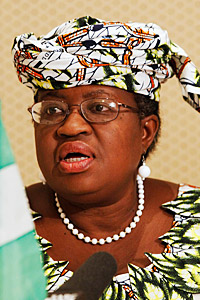The war in Ukraine is causing immense, heart-wrenching human suffering. At the World Trade Organization (WTO), an institution based on the rule of law and established to help forge peace, we find the violence abhorrent to our fundamental principles. We echo UN Secretary-General Antonio Guterres's call for the bloodshed to stop, and we wish for a prompt and peaceful resolution of the conflict.
But even as we remain transfixed by the shocking and tragic images of Ukrainian cities under attack, and even as we commit to doing all we can individually and collectively to help Ukraine's people, it is also becoming clear that the war's economic and humanitarian repercussions will be felt far beyond Europe. We have a responsibility to mitigate these consequences proactively as well.
Even prior to the war, rising food and energy prices were straining household and government budgets in many smaller and poorer countries whose economies had also been among the slowest to recover from the Covid-19 pandemic. New price spikes triggered by the conflict in Eastern Europe now threaten to cause poverty and food insecurity to rise. In these circumstances, the role of the WTO and trade in general, particularly for countries that are net food importers, is of paramount importance in preventing hunger.
While Ukraine and Russia together account for a modest 2.2% of global goods trade, this figure understates their significance in grain and energy markets, and as suppliers of fertiliser, minerals, and other inputs critical for a wide range of downstream production activities. In 2020, for example, the two countries supplied 24% of globally traded wheat and 73% of sunflower oil.
Imports of such commodities are essential for basic food security in the many countries that lack the water, soil, and weather conditions to grow all the food they need. Over the past 30 years, Ukraine and Russia have become key sources of grain for countries including Mongolia, Sri Lanka, Lebanon, Egypt, Malawi, Namibia and Tanzania. The World Food Programme, the UN agency that provides food aid to people affected by conflict and disasters in more than 80 countries, typically procures more than half of its wheat from Ukraine.
War-induced blockages of Ukrainian ports and the international sanctions imposed on Russia have sharply reduced the available global volume of wheat. Fears that Ukrainian farmers will be prevented from growing this year's spring crop have compounded supply concerns, causing the price of wheat futures to rise 40% and reach record highs in the first week of March.
Surging energy and food prices have begun to elicit familiar policy responses, with several governments restricting exports of grains and other key foodstuffs in an effort to maintain domestic supplies and limit price increases. The rising number of complaints to the WTO from exporters in several member countries and jurisdictions underscores the extent of the problem. Such export controls can trigger a spiral of price increases and new restrictions. The World Bank estimates that 40% of the increase in global wheat prices during the last food-price crisis in 2010-11 resulted from governments' attempts to insulate domestic markets.
But the world can mitigate these risks. Experience shows that international cooperation can help manage the knock-on effects of surging food prices. For a decade, sharing information about food supplies and stockpiles through the Agricultural Market Information System has enabled leading exporters and importers to prevent panics and keep markets functioning smoothly. With the global trading system already struggling to cope with high transport costs and congested ports, closer coordination could help stabilise international markets for food, energy, and commodities, and minimise additional disruptions to supply chains. Importantly, the WTO's monitoring and transparency function can help ensure that food and agriculture supply chains that are not directly affected by sanctions remain open and operate efficiently.
Better visibility regarding market disruption would also enable the international community to identify and mobilise financial and other assistance for poor countries badly affected by rising food prices. This is particularly urgent because, even before the Ukraine war, the post-pandemic economic recovery had been leaving much of the world behind. Growth in the poorest countries was furthest behind the pre-2020 trend, reflecting their weak fiscal capacity and inequitable access to Covid-19 vaccines.
As the world watches Ukraine's unfolding tragedy, we must all urgently focus on how to support the Ukrainian people. And it is natural and appropriate that governments will concentrate on the disruption to their own economies. But we must also act now to ensure that some of the world's poorest and most vulnerable people -- far away from the conflict and absent from the headlines -- do not become collateral damage. ©2022 Project Syndicate
Ngozi Okonjo-Iweala, Director-General of the World Trade Organization, is a former finance minister and foreign minister of Nigeria and a former managing director of the World Bank.
